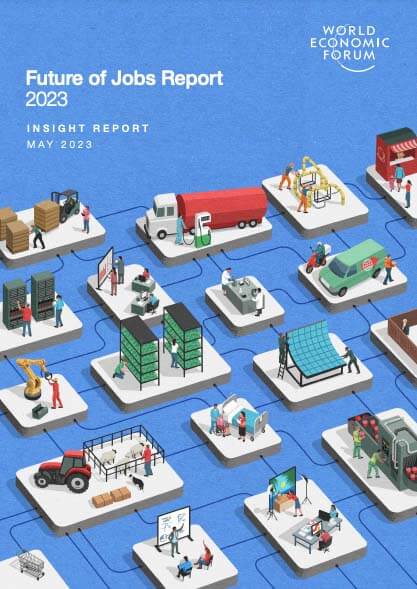Top 2023 Job Skills
- Analytical thinking
- Creative thinking
- Resilience, flexibility, and agility
- Motivation and self-awareness
- Curiosity and lifelong learning
- Technological literacy
- Dependability and attention to detail
- Empathy and active listening
- Leadership and social influence
- Quality control
Find the full report at weforum.org.
Source: World Economic Forum “Future of Jobs Report 2023”
Analytical and creative thinking top the World Economic Forum’s (WEF) list of the 10 most in-demand job skills in 2023 and are the two skills growing the fastest in importance, according WEF’s biannual “Future of Jobs” report. Rounding out the top five skills are resilience, flexibility, and agility; curiosity and lifelong learning; and motivation and self-awareness — all of which reflect the ongoing importance of continuous learning. The report predicts that globally, nearly a quarter of all jobs will change in the next five years, and estimates that 44 percent of workers’ skills will be disrupted.
New this year are skill clusters related to working in what the report called “disrupted workplaces,” including dependability and attention to detail and quality control. Also among the top 10 are two skill clusters relating to working with others — empathy and active listening and leadership and social influence. Technological literacy came in at sixth place, a skill that is ranked as the third-fastest growing core skill.
Most of the skills on the list are so-called soft skills, or what future of work and technology strategist Heather McGowan has said she prefers to call “uniquely human skills.” For the first time, ethical skills surfaced in the report, which was attributed to shifts in the importance of social and environmental issues — 68 percent of companies said that consumers becoming more vocal on those issues “is likely or highly likely to drive transformation within their organization in the next five years.”
For business event professionals, the report offers insights not only into how they may develop their own skills, but into the kinds of education and experiences likely to add value to event participants. Companies reported that the highest priority for skills training for the next five years is analytical thinking, expected to account for 10 percent of training initiatives, and creative thinking, which will account for 8 percent of upskilling initiatives. Training workers in how to use AI and big data ranked third among skills-training priorities — more than 85 percent of organizations said that they expected new technology to be the key driver of business transformation in the next five years.
Barbara Palmer is deputy editor of Convene.

